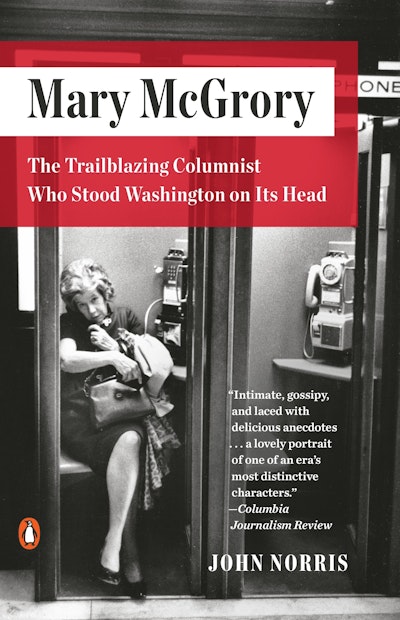- Published: 22 September 2015
- ISBN: 9780698407824
- Imprint: PEN US eBook Adult
- Format: EBook
- Pages: 352
Mary McGrory
The Trailblazing Columnist Who Stood Washington on Its Head
- Published: 22 September 2015
- ISBN: 9780698407824
- Imprint: PEN US eBook Adult
- Format: EBook
- Pages: 352
Sampler of Mary McGrory in her own words.
On writing political columns:
"We think you should add humor and color and charm and flair to the news pages."
She sipped her root beer and smiled coyly. "Oh, is that all?"
On comportment at Washington parties:
"Always approach the shrimp bowl like you own it."
To LBJ after he propositioned her:
"I admire you, Mr. President, and I always will. And I think you are doing a terrific job, and that is where it stops--right there."
President Johnson finished his drink and said, "I just wanted you to know."
"Now I know," she replied. "Thank you."
Of Wisconsin Sen. Joe McCarthy:
"I had seen his likes all my life, at wakes, at weddings, at the junior prom. . . . He was an Irish bully boy."
Of the Army-McCarthy senate hearings:
"It's too early yet to tell about the plot, but they've certainly got a cast there. The star, Senator McCarthy, ploughs his high-shouldered way through the crowds amid small cheers."
Roy Cohn, McCarthy's lawyer, "looks like a boy who has been reprimanded at school and has come back with his elders to get the thing straightened out."
Secretary of the Army Robert Stevens looked "about as dangerous as an Eagle Scout."
On her own popularity:
"All of a sudden people wanted to adopt me, marry me, poison me, run me out of town."
On Congress:
A pair of members debated on the floor of Congress, "like two elderly polar bears negotiating the pas de deux from 'Swan Lake.'"
A senator from Wisconsin ran on a platform of "preparedness, non-intervention, and cheese."
On the Kennedys:
On the night following JFK's death, "We'll never laugh again."
"I never thought the Kennedys thought that much for the party. You have your own party."
An enraged telegram McGrory sent to Bobby Kennedy after his pronouncement that he would not run for president: "St. Patrick did not drive all the snakes out of Ireland."
Bobby Kennedy "was fierce. He could be rude. He shared the Kennedy conviction that the Kennedys, if not born, had at least been bred to rule. And he attracted the adulation and the rage which his clan, with their splendid, doomed lives, aroused in a nation that had never seen such a compelling collection of human beings, so beautiful, so armored, and so vulnerable."
On career women:
"I guess the men think the best thing about me is my writing."
On Richard Nixon,
"If he were a horse, I should not buy him."
Reacting to Nixon's "You won't have Nixon to kick around any more" speech,
"Mr. Nixon carried on for 17 minutes in a finale of intemperance and incoherence unmatched in American political annals. He pulled the havoc down around his ears, while his staff looked on aghast. His principal target was the press. But he was like a kamikaze pilot who keeps apologizing for the attack. Every time he scorched the Fourth Estate, his voice curling with rage and scorn, he insisted that he had no complaint."
On Nixon's announcement that he was resigning the presidency,
"[E]erily like thousands of others he has given during the almost 40 years he has been seeking, gaining and losing public office. . . Richard Nixon's small store of pity had always been reserved for himself."
On the Washington Star newsroom,
"It was heaven. . . . Just a wonderful, kind, welcoming, funny place, full of eccentrics and desperate people trying to meet five deadlines a day."
On the Washington Post,
"[W]e take ourselves very seriously, and are much too busy to say good morning even ten hours before deadline.
On herself:
"If I wanted to be fair and objective, I wouldn't be writing,"


